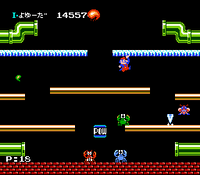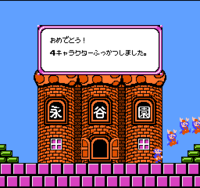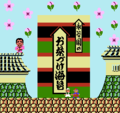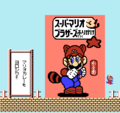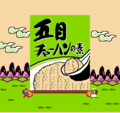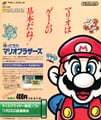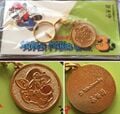Mario Bros. Returns: Difference between revisions
LinkTheLefty (talk | contribs) (Put names & translations in Names in other languages section; extended Famicom to Family Computer; added what may be a partial port (which currently has coverage in Mario Bros. game article's trivia).) |
Tags: Mobile edit Advanced mobile edit |
||
| (142 intermediate revisions by 50 users not shown) | |||
| Line 1: | Line 1: | ||
{{italic title}} | {{italic title}} | ||
{{ | {{game infobox | ||
|image=[[File:Kaettekita Mario Bros Title.png|256px]]<br>The title screen | |||
|image=[[File: | |||
|developer=[[Nintendo Entertainment Analysis and Development|Nintendo EAD]] | |developer=[[Nintendo Entertainment Analysis and Development|Nintendo EAD]] | ||
|publisher=[[Nintendo]] | |publisher=[[Nintendo]], [[Nagatanien]] | ||
|platforms=[[Family Computer Disk System]] | |platforms=[[Family Computer Disk System]] | ||
| | |release='''Family Computer Disk System:'''<br>{{flag list|Japan|November 30, 1988<ref>Game ads (see [[#Gallery]])</ref>}} | ||
|languages={{languages|jp=y}} | |||
|genre=Platformer | |genre=Platformer | ||
|modes= | |modes=1–2 players | ||
|ratings= | |ratings= | ||
| | |format={{format|fds=1}} | ||
|input={{input| | |input={{input|fc=1}} | ||
|serials=FMC-KMB | |||
}} | }} | ||
''''' | '''''Mario Bros. Returns''''',<ref>{{cite|quote="KaetteKita" Mario Bros. (Mario Bros. Returns): Released in November 1988 as a Disk Writer game for rewrite.|title=Iwata Asks - Paper Mario: Sticker Star|url=https://iwataasks.nintendo.com/interviews/3ds/papermario/0/0/|page=1|publisher= Nintendo|language=en|accessdate=November 21, 2024|archive=https://web.archive.org/web/20240901154324/https://iwataasks.nintendo.com/interviews/3ds/papermario/0/0/}}</ref> also known as '''''Mario Bros. have returned''''',<ref>{{cite|deadlink=y|archive=web.archive.org/web/20150602204527/https://r.ncp.nintendo.net/whitelist|title=List of Supported Games|publisher=Nintendo Creators Program|language=en}}</ref> is a game for the [[Family Computer Disk System]] released on November 30, [[List of games by date#1988|1988]], through the Disk Writer service. This game was co-published by [[Nintendo]] and [[Nagatanien]], a Japanese food company. It is an updated version of ''[[Mario Bros. (game)|Mario Bros.]]'' that was released only in Japan,<ref>{{cite|url=www.gamespot.com/famicomds/action/kaettekitamariobrothers/index.html|title=GameSpot|accessdate=June 22, 2024}}{{dead link}}</ref> although the 1993 European [[Nintendo Classics|Classic Series]] re-release resembles it,<ref>{{cite|url=nindb.net/nes/mario-bros-classic-series/index.html|title=''Mario Bros. Classic Series''|publisher=NinDB|accessdate=June 22, 2024|language=en}}</ref> using the same enemy sprites and colors from this game. This is the last game of the [[Super Mario (franchise)|''Super Mario'' franchise]] for the Family Computer Disk System, excluding ports, as well as the last ''Super Mario'' game to be released during the {{wp|Shōwa era}} of Japan, coming out just over a month before the death of emperor {{wp|Hirohito}}. | ||
==Game | ==Game modes== | ||
The game has several modes that can be accessed from the main menu. | The game has several modes that can be accessed from the main menu. | ||
===[[Mario Bros. (game)|Original Mario Bros.]]=== | ===[[Mario Bros. (game)|Original Mario Bros.]]=== | ||
This mode plays similarly to the ''Mario Bros.'' | [[File:KMB 1P.png|thumb|left|Phase 18]] | ||
* | This mode plays similarly to the Japanese arcade version of ''Mario Bros.'' However, there are several differences from the arcade or [[Arcade Classics Series|earlier NES port]]. | ||
*One of three Nagatanien advertisements will appear before the first phase. One ad is for ''ochazuke nori'' and features singer-actor {{wp|Saburō Kitajima}} who appeared in Nagatanien ads during the game's release. Its BGM is an arrangement from the commercial's song. The other ads are for ''gomoku'' fried rice mix and ''[[Super Mario Bros. 3]]'' branded ''furikake''. | |||
*[[Mario]] and [[Luigi]] can now change direction in mid-air (much like modern remakes). | *[[Mario]] and [[Luigi]] can now change direction in mid-air (much like modern remakes). | ||
* | *Mario's color scheme is now the same as his ''[[Donkey Kong (game)|Donkey Kong]]'' palette. | ||
*The graphics and music were improved somewhat compared to the earlier port. | |||
*The top five high scores can now be saved like in the arcade version but not in the earlier port. Names can be longer and in Japanese. | |||
{{br}} | |||
===Nagatanien World=== | ===Nagatanien World=== | ||
[[File: | [[File:Kaettekita Mario Bros Slots.png|thumb|The slots mini-game]] | ||
This mode is similar to Original Mario Bros., but | This mode is similar to Original Mario Bros., but with three additional features: | ||
*After losing all lives and receiving a | *In addition to watching one of the three ads like above, another cut-scene addressing the player's registered name will advertise products before Phase 1. | ||
*After losing all lives and receiving a Game Over, players will be given the chance to play a slot machine [[minigame]]. The slots can display a {{wp|kanji}} for Nagatanien, a Shellcreeper sprite, and the upper halves of sprites for Mario and Luigi. Should they get a match, they will be allowed to continue their game without the score and phase counters resetting. However, this area can only be visited once per game. | |||
**Nagatanien (永谷園) - 4 extra lives | **Nagatanien (永谷園) - 4 extra lives | ||
**Three matches- 2 extra lives | **Three matches - 2 extra lives | ||
**Two matches - 1 extra life | **Two matches - 1 extra life | ||
*After reaching 100,000 points, players are given promotional codes that can be mailed in to | *After reaching 100,000 points, players are given promotional codes that can be mailed in to a raffle for a pack of ''[[Super Mario Bros. 3]]''-themed playing cards. At 200,000 points, players are given another code for entry in a drawing for a ''Super Mario Bros. 3'' cartridge, which released one month earlier in Japan on the [[Family Computer]]. All players who sent in codes also had a chance to win a ''Super Mario Bros. 3'' keychain. This promotion was active from November 30, 1988 to May 31, 1989. | ||
This promotion was active from November 30, 1988 to May 31, 1989. | |||
===Name registration=== | ===Name registration=== | ||
Players | Players 1 and 2 may register their name, age, and gender. These are used when a high score is broken and to refer to players with honorifics appropriate for their gender. | ||
===Notices=== | ===Notices=== | ||
In this mode, a [[Shellcreeper]] explains the promotional features of Nagatanien World. | In this mode, a [[Shellcreeper]] explains the promotional features of Nagatanien World. | ||
==Gallery== | |||
===Artwork=== | |||
<gallery> | |||
SMB Mario Jumping Artwork.png|Artwork of [[Mario]] | |||
</gallery> | |||
===Sprites=== | |||
<gallery> | |||
KMBMarioSprite.png|Mario | |||
KMB Mario Jumping.png|Mario [[jump]]ing | |||
KMB Mario Death.png|Mario dying | |||
KMBLuigiSprite.png|[[Luigi]] | |||
KMB Luigi Jumping.png|Luigi jumping | |||
KMB Luigi Death.png|Luigi dying | |||
KMB Shellcreeper.png|[[Shellcreeper]] | |||
KMB Sidestepper.png|[[Sidestepper]] | |||
KMB Fighter Fly.png|[[Fighter Fly]] | |||
KMB Slipice.png|[[Freezie|Slipice]] | |||
KMB Icicle.gif|[[Icicle]] | |||
</gallery> | |||
===Screenshots=== | |||
<gallery> | |||
KMB Luigi.png|''Ochazuke nori'' by Nagatanien | |||
KMB Mario.png|''[[Super Mario Bros. 3]]'' branded ''furikake'' | |||
KMB gomoku.png|''Gomoku chahan'' | |||
</gallery> | |||
===Miscellaneous=== | |||
<gallery> | |||
KaettekitaAD1.jpg|Game advertisement | |||
KaettekitaAD2.jpg|Game advertisement | |||
Kaettekita Mario Bros. disk stickers.jpg|Side A and B disk stickers | |||
Nagatanien gold keychain.jpg|Keychain prize | |||
</gallery> | |||
==Names in other languages== | ==Names in other languages== | ||
{{ | {{foreign names | ||
| | |Jpn={{ruby|帰|かえ}}ってきた マリオブラザーズ<br>(disk label)<br>かえってきた MARIO BROS.<br>(title screen) | ||
| | |JpnR=Kaettekita Mario Burazāzu | ||
| | |JpnM=Mario Bros. Returns}} | ||
;Original Mario Bros. | |||
{{foreign names | |||
|Jpn=オリジナル マリオブラザーズ | |||
|JpnR=Orijinaru Mario Burazāzu | |||
|JpnM=Original Mario Bros. | |||
}} | |||
;Nagatanien World | |||
{{foreign names | |||
|Jpn=ながたにえん ワールド | |||
|JpnR=Nagatanien Wārudo | |||
|JpnM=Nagatanien World | |||
}} | |||
;Name registration | |||
{{foreign names | |||
|Jpn=なまえとうろく | |||
|JpnR=Namae Tōroku | |||
|JpnM=Name registration | |||
}} | |||
;Notices | |||
{{foreign names | |||
|Jpn=おしらせ | |||
|JpnR=Oshirase | |||
|JpnM=Notices | |||
}} | |||
==References== | ==References== | ||
{{NIWA|StrategyWiki=Kaettekita Mario Bros.}} | |||
{{TCRF|Kaettekita Mario Bros.}} | |||
<references/> | <references/> | ||
{{ | |||
{{Super Mario games}} | |||
{{NES}} | {{NES}} | ||
[[de:Kaette Kita Mario Bros.]] | [[de:Kaette Kita Mario Bros.]] | ||
[[Category:Mario Games]] | [[Category:Mario Bros.|*]] | ||
[[Category:Games]] | |||
[[Category:1988 games]] | [[Category:1988 games]] | ||
[[Category:Japan-only games]] | |||
[[Category:Japan | |||
[[Category:Remakes]] | [[Category:Remakes]] | ||
[[Category: | [[Category:Platforming games]] | ||
[[Category:Family Computer Disk System games]] | |||
[[de:Kaette Kita Mario Bros.]] | |||
[[it:Kaettekita Mario Bros.]] | |||
Latest revision as of 06:07, February 24, 2025
| Mario Bros. Returns | |
|---|---|
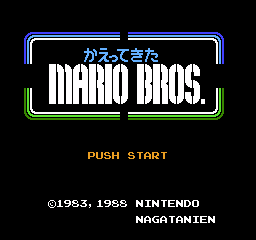 The title screen | |
| Developer | Nintendo EAD |
| Publisher | Nintendo, Nagatanien |
| Platform(s) | Family Computer Disk System |
| Release date | Family Computer Disk System: |
| Language(s) | Japanese |
| Genre | Platformer |
| Mode(s) | 1–2 players |
| Format | FDS:
|
| Input | Famicom:
|
| Serial code(s) | FMC-KMB |
Mario Bros. Returns,[2] also known as Mario Bros. have returned,[3] is a game for the Family Computer Disk System released on November 30, 1988, through the Disk Writer service. This game was co-published by Nintendo and Nagatanien, a Japanese food company. It is an updated version of Mario Bros. that was released only in Japan,[4] although the 1993 European Classic Series re-release resembles it,[5] using the same enemy sprites and colors from this game. This is the last game of the Super Mario franchise for the Family Computer Disk System, excluding ports, as well as the last Super Mario game to be released during the Shōwa era of Japan, coming out just over a month before the death of emperor Hirohito.
Game modes[edit]
The game has several modes that can be accessed from the main menu.
Original Mario Bros.[edit]
This mode plays similarly to the Japanese arcade version of Mario Bros. However, there are several differences from the arcade or earlier NES port.
- One of three Nagatanien advertisements will appear before the first phase. One ad is for ochazuke nori and features singer-actor Saburō Kitajima who appeared in Nagatanien ads during the game's release. Its BGM is an arrangement from the commercial's song. The other ads are for gomoku fried rice mix and Super Mario Bros. 3 branded furikake.
- Mario and Luigi can now change direction in mid-air (much like modern remakes).
- Mario's color scheme is now the same as his Donkey Kong palette.
- The graphics and music were improved somewhat compared to the earlier port.
- The top five high scores can now be saved like in the arcade version but not in the earlier port. Names can be longer and in Japanese.
Nagatanien World[edit]
This mode is similar to Original Mario Bros., but with three additional features:
- In addition to watching one of the three ads like above, another cut-scene addressing the player's registered name will advertise products before Phase 1.
- After losing all lives and receiving a Game Over, players will be given the chance to play a slot machine minigame. The slots can display a kanji for Nagatanien, a Shellcreeper sprite, and the upper halves of sprites for Mario and Luigi. Should they get a match, they will be allowed to continue their game without the score and phase counters resetting. However, this area can only be visited once per game.
- Nagatanien (永谷園) - 4 extra lives
- Three matches - 2 extra lives
- Two matches - 1 extra life
- After reaching 100,000 points, players are given promotional codes that can be mailed in to a raffle for a pack of Super Mario Bros. 3-themed playing cards. At 200,000 points, players are given another code for entry in a drawing for a Super Mario Bros. 3 cartridge, which released one month earlier in Japan on the Family Computer. All players who sent in codes also had a chance to win a Super Mario Bros. 3 keychain. This promotion was active from November 30, 1988 to May 31, 1989.
Name registration[edit]
Players 1 and 2 may register their name, age, and gender. These are used when a high score is broken and to refer to players with honorifics appropriate for their gender.
Notices[edit]
In this mode, a Shellcreeper explains the promotional features of Nagatanien World.
Gallery[edit]
Artwork[edit]
Artwork of Mario
Sprites[edit]
Mario jumping
Screenshots[edit]
Super Mario Bros. 3 branded furikake
Miscellaneous[edit]
Names in other languages[edit]
| Language | Name | Meaning | Notes |
|---|---|---|---|
| Japanese | (disk label) かえってきた MARIO BROS. (title screen)[?] Kaettekita Mario Burazāzu |
Mario Bros. Returns |
- Original Mario Bros.
| Language | Name | Meaning | Notes |
|---|---|---|---|
| Japanese | オリジナル マリオブラザーズ[?] Orijinaru Mario Burazāzu |
Original Mario Bros. |
- Nagatanien World
| Language | Name | Meaning | Notes |
|---|---|---|---|
| Japanese | ながたにえん ワールド[?] Nagatanien Wārudo |
Nagatanien World |
- Name registration
| Language | Name | Meaning | Notes |
|---|---|---|---|
| Japanese | なまえとうろく[?] Namae Tōroku |
Name registration |
- Notices
| Language | Name | Meaning | Notes |
|---|---|---|---|
| Japanese | おしらせ[?] Oshirase |
Notices |
References[edit]
- ^ Game ads (see #Gallery)
- ^ "KaetteKita" Mario Bros. (Mario Bros. Returns): Released in November 1988 as a Disk Writer game for rewrite. – Iwata Asks - Paper Mario: Sticker Star. Nintendo (English). Page 1. Retrieved November 21, 2024. (Archived September 1, 2024, 15:43:24 UTC via Wayback Machine.)
- ^ List of Supported Games. Nintendo Creators Program (English). Archived June 2, 2015, 20:45:27 UTC from the original via Wayback Machine.
- ^ GameSpot. Retrieved June 22, 2024.[dead link]
- ^ Mario Bros. Classic Series. NinDB (English). Retrieved June 22, 2024.
| show Super Mario games |
|---|
| showFamily Computer / Nintendo Entertainment System games |
|---|
